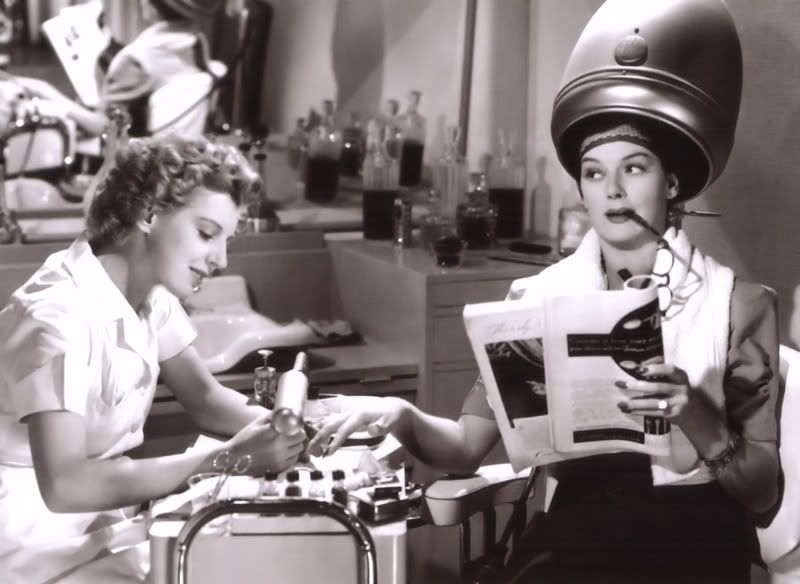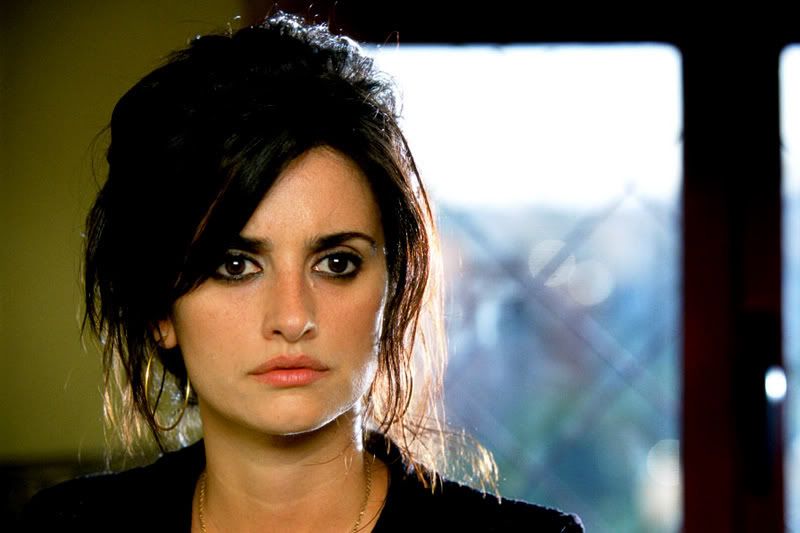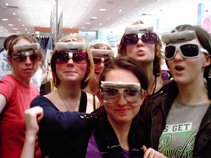Butterfly searchin for a relax
Pullin from the jazz stacks cause it's Sunday
On the air is incense sounds to the ceiling
Tried to get this feelin since Monday
Lookin out the window watchin all the people go
Buggin off a funny vibe cause now it seems they're equal
Wonder what would 'trane say wonder what my pop say
Buggin off the calmness in the Apple
Who me I'm coolin in NY, I'm chillin in NY
The hoods is on my block and the brothers at the court
The baseball hats is on and the projects is calm
Dreamtime's extended - and highly recommended
But early birds like me's up checkin out the scene
The early worms jog, forget about your job
Just come dig the essence while the decadence is hidden
when people act like people the theory ??
If you know the norm it's like Hades transformed
On sunday's early hours the city sprouts its flowers
So get with the rhythms while you gettin with the planets
Vibe off the jams but don't take them for granted
We venture through the streets in search of funky beats
Extensive is the travels and it's heavy on the sneaks
ye it's kickin out the speakers of the sunday morning jeepers
my man do planets do it lovely?
Am I my brother's keeper?
We foot it to the park where the swoon units walk
And sit with the phoenicians diggin on musicians
Hangin with the rebels sippin on a Snapple
Buggin with my crew just trippin in the Apple
you be thinkin peace when you're vibin with your flock
But you be thinkin damn everybody's got a glock
If you got some beef please express that in silence
or else - violence
But right here is the life it's the children of the concrete
Livin off the fruits and the functions of the fat beats
Hip-Hop's all around the members is growin
Please dig on the sounds cause the good vibes they snowin
Wake up, prayin' that the game's on
Maybe it's the Runnin' Rebs, maybe it's the Knicks
maybe it's a rerun of an old tv show
like hawaii 5-0 or karate flicks
maybe if the phone rings butterfly will take wings
speakin on some cool things frontin like i cope
born under flat ground now i'm chillin shaky ground
reachin for pacific heights sunday is my rope - dig it
Sunday's to relax
Some Sunday morning drama is callin up my mama
The hot line is in I guess they knew the deal
Vibin off the jams of the crews on Sugarhill
Lay around and think ain't nothin to do
Checkin out some frommes, some satre, camus
Mingus's Ah Um, damn Roach can drum!
The DP's are life there they go here they come
It's time to grab some loot put on the timber boots
Checking out some dollies/dali's like tasha and kamali
NY is a museum with its posters and graffiti
If you're in the city on Sunday
come check me, get with me
Sunday, April 29, 2007
Sunday's Lyrics
Saturday, April 28, 2007
Bouncing Off Clouds!
Yes!!! The new album is mine, as of this morning, when my darling mother decided to treat me, under the promise of housework. Sure, I'll do the hoovering if it means getting my mitts on the Limited Edition version. Which is the version I plumped for, even though I promised myself I wouldn't. I've done this with Radiohead's Hail to the Thief and Tori's Scarlett's Walk and a couple others, and the problem with Special Editions is that they never fit onto my cd shelf. Which is a minor annoyance, but I cannot resist the lure of a lush fold-out package with an extra dvd promising bonus material and postcards.
I'm glad I chose the Special Edition, in the end. The packaging is really great; numerous striking photographs of Tori dolled up in dresses and wigs, short blurbs introducing us to the 4 new concept characters (nothing straightforward about them, no "favourite colour" bullshit to let us into their personalities. although Pip's line "Alternatively, to think that some cheerleaders don't have razors in their snatch is to be foolishly unarmed" made me snort with laughter). The dvd is minor, there's no interviews or studio footage but we do get footage of them shooting the cover art and photographs, plus there's a great great great song, "My Posse Can Do" that should have been included on the album proper.
So, onto the album. At 23 tracks, it's far too long. That's not really up for debate, most anyone will agree that 10 or 12 great songs is far better than an album twice as long, but half as good. After only one full-through listen (though it was an "attentive, no reading the new issue of Empire, through headphones" kinda listen) I'm still a little hazy in some parts. There are some definite stand-outs already, single "Big Wheel", the respectfully barbed "Yo George", the jaunty "Programmable Soda". Tori starts channeling her neglected fan-favourite "Take To The Sky" on the Russian-themed "Velvet Revolution" and there's some exquisite string sections and harmonies. And I haven't even mentioned the glam-rock stomp feel she has going on at many points, which is unexpected, but kinda awesome. I might write a proper review if I can focus my thoughts a little more cohesively, but it'll take a little while for me to break this album in, due to it's sheer magnitude. Word.
Friday, April 27, 2007
Daft Punk Are Playing In My Head...In My Head.
Some news to set us up for the weekend:
- "American Doll Posse" gets a good review in The Guardian today! Caroline Sullivan gives it 4/5 stars, "Some of her best work in years is here...cut to ten tracks it would have been one of her most significant records". I have no idea when I'll have the cash to buy it, but it looks set to be a good one.
- Julia Stiles ditches the Shakespeare adaptations to star in the film adaptation of Sylvia Plath's The Bell Jar. Which could go either way, really. Especially when you read what they say about it, The book has many dark overtones, but Rattray said the project will emphasize some of the more uplifting elements. "Esther Greenwood has a strong outlook on life, and we're really looking to bring out the humor in the character," she said. "We don't want to do a depressing descent into the world of suicide." It's been two years since I read The Bell Jar, but I don't recall it being a bundle of hilarity. Maybe that was just me..
-Another book-to-film adaptation I heard about last week but neglected to mention, is the fabulous The Time Traveler's Wife, which is set to star Eric Bana and Rachel McAdams. The director will be the German, Robert Schwentke. Before he signed on, rumoured directors were the likes of Speilberg, Fincher and Gus Van Sant. I'm relieved it's a relative unknown instead, hopefully it'll stay true to the spirit and scope of the source novel.
- My hanky is already damp...Apparently the Magneto spin-off will not star Ian McKellen, but a younger actor. Why they'd do such a thing is beyond me...those damn fools! No-one will ever fill that ridiculous helmet as well.
- Not really "news" per se, but my family finally found a copy of the third (and final) season of Arrested Development last weekend. My parents have finished watching it, I still have half to go. I'm loath to finish, because after that I know I'll have no new epsiodes left to see. Still, I can console myself with the beloved Chicken Dance...
Monday, April 23, 2007
Y Kant Tori Make Good Videos?

I'm all excited! The last time Tori Amos had a new album coming out, it was entitled "The Beekeeper" and I bought it with money recieved after doing the Junior Cert. I was really pysched about buying it and I distinctly remember getting it, along with Bloc Party's debut "Silent Alarm" on the same day. I even got the Special Edition of Tori's album, paying just that little bit extra for fancy packaging and a dvd just because I love her music.
Unfortunatly, it was terrible. I listened to it twice through and put it back on the shelf. Since then I've listened to certain tracks again, but mostly it lies there gathering dust, unlistened to. "The Beekeeper" is a very poor album, especially from an artist with such a great back catalogue.
But I suppose Tori Amos has always been quite patchy. Out of the albums I'm familiar with, here are my rankings:
1. Under The Pink (1993)
2. Little Earthquakes (1991)
3. From The Choirgirl Hotel (1998)
4. Scarlett's Walk/Welcome to Sunny Florida (2002/2004)
5. Strange Little Girls (2001)
6. To Venus and Back (1999)
.
.
.
.
.
176. The Beekeeper (2005)
Obviously I'm discounting her best-of and I haven't heard Boys For Pele properly the whole way through to comment on and I doubt I'll ever want to hear "Y Kant Tori Read", but it's clear that Amos' best work is her earlier material, before marriage and motherhood dulled her tongue and knack for a tune. A journalist once commented that the only way to get a decent album from Tori nowadays would be to "kidnap her daughter" which is harsh, but probably true. I certainly thought so, until I saw the video for her latest single "Big Wheel".
Okay, the video is very student-y and shoddily made, but the song is such a refreshing change! I love the jaunty piano, the bluegrassy feel of the chorus, the sense that Tori has her spark back. I'm suddenly eager to buy its parent album, "American Doll Posse" which is landing instores on 1st May. Looking at the promo pictures and hearing this song has restored my faith! Here's hoping it's not another Beekeeper-fiasco...
Edit - Okay, well it looks like the video got pulled off YouTube. No matter, you can still hear it, along with the rest of "American Doll Posse" at Tori's Myspace. There's only so much stop-motion Tori you can take, so it's probably better just to listen to it.
I was almost reluctant to hear these songs before buying the album, but then I thought - screw it. It's not illegal if she put them up herself, and I have no idea when I'll have the money to buy the real thing. Currently on track 4 (but I won't get much further as I'm going to Stars In Yer Eyes in a few minutes. Perliminary thoughts - it's very much a rock album, which can only be a good thing after the Middle-of-the-Road cringe that was "The Beekeeper". I'm still psyched, people.
Thursday, April 19, 2007
Vote For Pedro!
I was never much for Spanish culture. A couple of years ago, had you asked me to talk about my favourite countries,
What was I thinking? Two main things changed my perception of the country. The first is this passage, written about my favourite band.
“Elements of the Banshees’ music always had that Spanish feel – the chord structures, even Siouxsie’s voice has flamenco flavour to it. The whole thing about it being a culture of cruelty and of beauty, the bullfights and the religious iconography, influenced both of us. It was passionate and colourful, and there’s a dark side to it.”
- Marc Almond, speaking in “Siouxsie and the Banshees, The Authorised Biography” by Mark Paytress
And the second thing that changed my mind?
Pedro Almodóvar is my favourite living director.
You can take your Tarantino, stuff your Scorcese, forget your Fincher and any other alliterative distain you can think of, only Almodóvar can truly captivate me, move me, make me laugh and cry simultaneously. His sense of colour is outstanding and he is a master of coaxing great acting out of his leading actresses (like George Cukor before him, Almodóvar is a great women’s director). He’s been writing and directing films since the early 1980s, as a frustrated boy kicking out against the
"Cinema has become my life. I don't mean a parallel world, I mean my life itself. I sometimes have the impression that the daily reality is simply there to provide material for my next film."
I haven’t watched all of his work, but I have seen nine of his 16 films so I feel I can talk about them with some level of confidence. This post will probably veer between fan-girl idolatry and serious critique, with the emphasis on the former.
Growing up in Franco’s
What Have I Done To Deserve This (1984) and Women on the Verge of a Nervous Breakdown (1988) are quite similar, in that they are early-Almodóvar finding his feet. Both feature Carmen Maura, whose reassuring solidness helps to ground some of the films’ more bizarre moments. She also has a playful quality, which is needed for storylines including, for no discernable reason, a young girl who can move things with her mind.
Women on the Verge of a Nervous Breakdown was the film that broke him out into the mainstream and I’ve read many reviewers describe it as his best. Again, it’s pure camp melodrama with a whole rake of characters and it messes with the audience’s perception of the roles of wife, son, prostitute etc. It’s also very surreal and camp, but for me, it lacks the emotional wallop of his later work.
There’s a good barometer of whether you’ll “get” Almodóvar or not in a line from What Have I Done To Deserve This. Miguel, a young boy of about 8 comes back to his mother after being given to a creepy pedophiliac dentist for adoption and says,
“At first it was fun, but I am too young to be tied down.”
If you think that’s perverse or stupid, there’s a good chance you won’t enjoy the rest of his oeuvre.
An endearing quality of his work is his habit of using the same actors over and over again. Antonio Banderas, Penelope Cruz, Cecilia Roth and Carmen Maura pop up over and over again. His films are sometimes like a really flamboyant game of Where’s Wally. An actress who doesn’t get enough credit is Chus Lampreave, who fits into the “hilarious old woman” role with ease. There she is, adopting lizards and dispensing advice in What Have I Done To Deserve This, as an elderly neighbour in Women on the Verge, as a cameo role in Talk To Her and was recently blinking through bottleglasses in Volver. I’d like to guess that Lampreave reminds Almodóvar of his mother or granny, it seems fairly plausible. Whenever she appears on screen she’s always funny, the gum-toothed comic relief who’s just one link in the chain of Pedro’s favoured actresses.
Atame! (1990) is a very, very fun film. It features a young Antonio Banderas who is clearly having the time of his life. Like a lot of Almodóvar, it’s a story of an unconventional relationship, in which Ricky (Banderas) leaves prison and sets out to find an actress, Marina (Victoria Abril), who he once slept with. When she rejects his amorous advances, he kidnaps her and ties her up. Their relationship is bizarre, she both hates and loves him, he clearly loves her but keeps her tied to a bed. It’s dealt with in a very humorous, warm way and although there is a happy ending, it’s slightly ambiguous. I’m reminded of the lovely subdued ending in The Graduate, when Dustin Hoffman and Katherine Ross sit together contentedly at the back of the bus, whenever I see it.
Live Flesh (1997) wasn’t one of my favourites, perhaps because the characters didn’t engage me as much as they did in his other work. Still, even a lesser Almodóvar is intriguing. The main character in this is David, a paraplegic basketball player who’s wife is having an affair – we delve into their past and revisit the night David lost the use of his legs. The storyline is more twisted and bizarre and fun than a lot of Hollywood
Now we come to All About My Mother (1990), the first Almodóvar I watched. It is my favourite Almodóvar film, my favourite foreign film and, hell, my favourite film of all time.
My parents owned the dvd for years, ever since it came out in 1999. I never took much notice of their dvds until one Friday in late 2003, when my younger sister was at a sleepover and they asked would I like to watch it with them. I had no idea what to expect, the box wasn’t much help but I had nothing better to be doing and so I settled down on the couch to watch.
Two hours later I was in shock, with a tear-stained face. I wasn’t exactly sure what I had just seen, an absurdly melodramatic plot encompassing pregnant nuns, lesbian drug addicts, A Streetcar Named Desire, a handful of transsexuals, Truman Capote, AIDs, motherhood and death, filtered through an outstanding sense of colour, sprinkled with humour and pathos and Alberto Iglesias’ haunting score.
Since that night I’ve watched it countless times and on each viewing I can find something else I love about it. The last time I saw it was on Sunday night, and, knowing the storyline, characters and script almost off by heart, I found myself marvelling at the cinematography, the dissolves from Esteban’s notebook to the twinkling bulbs of the dressing-room, the colour scheme, the thought and effort put in to make every shot framed beautifully. It’s his most mature, poetic work to date and if he never makes another film as good as it, he will still remain my favourite director.
Basically, All About My Mother is a story about a mother, Manuela (perfectly played by the Argentinean actress Cecilia Roth) who lives alone with her son, Esteban. Now, males don’t really get much of a fair deal in Almodóvar films usually, but the character of Esteban is great. The film begins on the eve of his 17th birthday as he and his mother sit down to watch the Bette Davis classic, All About Eve. Before the film starts, they chat and we learn a couple of things from their short conversation, that Esteban and his mother have an unusually close relationship, that there is no father in the picture and that Esteban is a talented and determined writer.
On his birthday, Manuela takes Esteban to the theatre to see A Streetcar Named Desire. We, the viewer, are allowed to see a small clip of the performance. Afterwards, the mother and son wait in the rain outside the theatre, sheltering under a doorway. He wants to wait to see the actors leave, she wants to get home but it’s his birthday and so she lets him. Esteban asks about his father; Manuela sighs and promises she will tell him who his father is once they get home. In a short, heartbreaking scene featuring an astonishingly real display of grief, Esteban is hit by a car and killed, while chasing after the actress who played Blanche in Streetcar for an autograph. It’s a shocking moment, even more so in that there is no prior indication of the tragedy. But, it serves to further the plot in a tasteful way, Manuela is destroyed by grief but manages to pull herself together enough to make the train journey back to Barcelona
Although he dies within the first 15 minutes, Manuela’s son haunts every scene of the film. She keeps his notebook on her coffee table and a framed picture of him in her bag, she mentions his name frequently, other characters learn about him. He is gone, but not forgotten.
A cast of characters are brought into play when we reach Barcelona Agra
All of these women are, in a sense, caricatures. Not that any of them are one-dimensional or poorly drawn, but there is a sense that each one has a specific motiff. There is no hiding this fact; it’s made blatantly clear even from the film’s trailer:
Part of every woman is a MOTHER (Manuela)
Part of every woman is an ACTRESS (Huma)
Part of every woman is a SAINT (Sister Rosa)
Part of every woman is a SINNER (Agrado)
What Almodóvar does beautifully is to highlight these caricatures. Part of the central theme in the film is roles, especially the roles women play. The storyline, impossibly camp though it is, never veers into farce or ridicule. Themes that may seem petty in the hands of another director take on a whole new lease of life, breathing with colour and music and drama. It’s a rich, warm, inviting film – and I end up blinking back the tears on every viewing.
Talk to Her (2002) is another masterpiece, a twisted love story. It was only the second film by him that I watched, and after All About My Mother I knew that nothing was going to compare in quite the same way, but I was gently surprised by it. In Talk To Her, two men form a bond as they both look after their girlfriends who are in comas in the hospital. Both couple’s stories blend together, inspersed with dance scenes and haunting music. It’s a very Spanish-tinged film, bull-fighting is a primary theme. I find this sport horrific and barbaric, but it has inspired great art and literature in the past and Talk to Her is a nice addition to this tradition. The sport is portrayed in an almost religious view. The scene in which the leading character is getting ready to enter the ring, putting on the clothing of the bull-fight, is given a strange reverence.
If you need one reason to watch Bad Education (2004), here it is: it stars Gael García Bernal in drag.
And, handsome as he is, Bernal makes for one convincing woman.
I’m not too sure how I feel about Bad Education. It’s been described as his Hitchcock-effort, his Film Noir, his most masculine film. Confused, would be my initial response. The plot twists and turns in on itself, a cinematic spiral; it’s about a film-director who is visited by a childhood friend, who is now an actor, who has written a play about their childhood together in a Christian Brother’s school. That’s the very distilled version of the plot, it would take too much energy and brain-power (both of which I simply don’t have) to properly explain it. Plus, I probably need to watch it again.
I don’t like it as much as his other stuff of this period. Mainly because, if I’m in the mood for Hitchcock, I’ll put on Hitchcock. If I’m in the mood for Almodóvar…well, you get my point.
It does have two wonderful aspects though; music and cinematography. There’s a handful of breathtaking scenes, one by a riverbank, one underwater in a swimming pool and another of a group of priests playing football – none of these scenes are especially integral to the development of the storyline, but they’re extremely pretty to look at. When you compare scenes like the slow motion shot of a cassock-ed priest diving to save a goal in the twinkling sunlight to some of his earlier work in Pepi, Luci, Bom, there’s really no comparison. It’s wonderful to see a progression like this and to be able to track it.
Volver is a Spanish verb meaning to return, or to come back. It is a suitable title for Pedro’s latest, which sees him return to the themes of mothers, sisters and women in the same melodramatic flamboyance that he perfected in 1999’s All About My Mother. It was a return to female-orientated pictures after a couple of more masculine (if that adjective can ever really be used to describe an Almodóvar picture) works and also a welcome return for his former muse, Carmen Maura.
Watching it for the second time last weekend on dvd, I was struck by how subtly Almodóvar inserts his primary theme of “returning” into every aspect of Volver. It is present from the very opening shot, which is classic Almodóvar. The camera pans across a graveyard on a blustery day. Amid the wind and tumbling leaves are a plethora of women busily scrubbing down the graves of their husbands, sons, fathers. The discerning viewer will note that the credits roll across the screen from right to left, an unusual stylistic trick. We are more used to seeing things go from left to right (take reading this, for example) and it is slightly disorientating to see them going backwards – backwards, or returning. This theme is present in everything from the casting of Carmen Maura to the ever-turning windmills that occasionally slip into shot. People come back to life, history repeats itself and Penelope Cruz gazes longingly into the distance and sings a torch-song with the same name as the film.
Carmen Maura and Pedro Almodóvar must be one of the all-time great film partnerships. He wrote great parts for her and she acted wonderfully for him. Think Jean-Luc Godard and Anna Karina, Hitchcock and blonde women. He directed her in 6 films, but after Women On The Verge… they parted ways. Here’s what Almodóvar had to say on the topic,
"Our relationship became impossible for personal reasons. It [had] something to do with the intense way I work with actors. My relationship with Carmen entered non-professional areas. It caused us both a great deal of pain. It's a long story”
In Volver, Carmen Maura is achingly funny as the grandmother returned from the dead. She’s greying now, but still retains her strange impish beauty. Her slightly wrinkled face is always cracking into a smile of delight or a frown of disapproval. She’s totally animated, and it’s a relief to see that her feud with Almodóvar is over. I’d love to see them do another couple of films together, perhaps addressing their ageing. However, unfortunately, he’s moved on. Move over Maura. There’s another Muse in town.
Penelope Cruz was a pretty, pale, minor character in his other films, but Volver is finally her chance to glow. Her Raimunda was my favourite performance of 2006 and possibly of all time. If she was slightly wooden in All About My Mother, here she is bursting with life, reacting and interacting with the trials of her everyday life with humour, pathos and incredulity. In an Almodóvar film, we must expect bizarre happenings and Volver is no different. Raimunda deals with the death of her aunt, the murder of her husband, her mother coming back to life, the terminal illness of her friend and somehow manages to run a restaurant amid all of this. With another, weaker actress, the part would be overwhelming, but Cruz tackles it head on.
In one scene, Raimunda is frantically destroying evidence of a murder. She rinses the blood-stained knife in the same sink she was washing the dishes in earlier. The mop is utilised to wipe the floor around the corpse. It’s a woman’s job; doing the housework, disposing of her husband’s body. Suddenly, a ring of the doorbell startles her. Hurriedly she shuts the kitchen door, adjusts her hair and opens the door to her apartment, trying to look as innocent as possible. It’s her neighbour asking her for a favour, and as they talk, the viewer notices a smidgen of blood on Raimunda’s neck. There’s a sickening knot in our stomach, will the neighbour notice? Of course he does, furrowing his brow in worry and asking her if she’s alright. Cruz blinks for a moment, and we think the game is up. She shrugs nonchalantly and pulls her shawl closer around her. “Women’s troubles,” she explains.
This scene is a perfect example of what Almodóvar is all about. It’s funny and suspenseful, a sly wink at the viewer, filled with meaning and a poetic sense of cinema. And in Raimunda’s casual line, there we have his entire oeuvre distilled into three seconds.
Pedro Almodóvar may be a man, but he knows “women’s troubles” better than anyone else. His love for women (and his main vision, as far as cinema is concerned) is articulately expressed in the dedication at the end of All About My Mother, far better than I ever could:
"To all actresses who have played actresses. To all women who act. To men who act and become women. To all the people who want to be mothers. To my mother."
Wednesday, April 18, 2007
Joanna Newsom concert Pt. 2
"Peach, Plum Pear"
Her hippie joke.
And, my highlight,
"Cosmia"
Awesomeness.
Happy Birthday to yoooooo...
I'll give you some clues. (Verbal and Picture)

He turns 36.

He's Scottish.

And, he's a Time-Lord.

Yep, that's right, everyone's favourite Doctor, Casanova, Harry Potter baddie, mental patient and Scotsman is celebrating today.

Aren't we all, aren't we all.
In the spirit of things, here are some choice Tennant YouTube clips:
Here he is, with Catherine Tate being actually funny for once.
The Smiths + weird dancing + David Tennant = random brilliance.
In case you didn't know, he was also in a Boots ad.
And on Posh Nosh!
I've searched for the West Wing quiz that was on More4 last year. It used to be on YouTube but someone apparently took it down. Pity, it was great - David Tennant answering questions on The West Wing. Le sigh.
Monday, April 16, 2007
You thought rock-stars were fussy?
Still, he likes to listen to Krautrock to get his juices flowing.
Read the article here and then try and determine what your vice would be. A bowl full of blue smarties? A North-Easterly wind gently blowing through the window? Albanian nose-flute music?
You decide.
Sunday, April 15, 2007
Rosencrantz & Guildenstern Are Dead (1990) Tom Stoppard
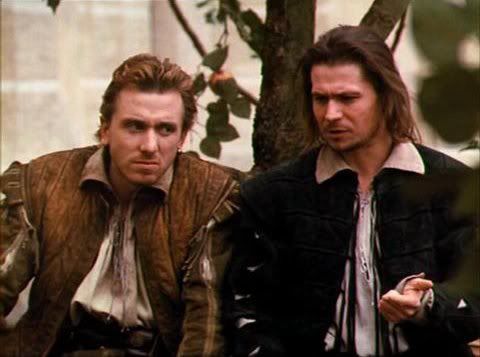
Hamlet: Words, words, words.
- Hamlet, William Shakespeare
Guildenstern: No.
Rosencrantz:Nor do I, really. It's silly to be depressed by it. I mean, one thinks of it like being alive in a box. One keeps forgetting to take into account the fact that one is dead, which should make all the difference, shouldn't it? I mean, you'd never *know* you were in a box, would you? It would be just like you were asleep in a box. Not that I'd like to sleep in a box, mind you. Not without any air. You'd wake up dead for a start, and then where would you be? In a box. That's the bit I don't like, frankly. That's why I don't think of it. Because you'd be helpless, wouldn't you? Stuffed in a box like that. I mean, you'd be in there forever, even taking into account the fact that you're dead. It isn't a pleasant thought. Especially if you're dead, really. Ask yourself, if I asked you straight off, "I'm going to stuff you in this box. Now, would you rather be alive or dead?" naturally, you'd prefer to be alive. Life in a box is better than no life at all, I expect. You'd have a chance, at least. You could lie there thinking, "Well, at least I'm not dead. In a minute somebody is going to bang on the lid, and tell me to come out."
[bangs on lid]
Rosencrantz: "Hey you! What's your name? Come out of there!"
Guildenstern: [long pause] I think I'm going to kill you.
Guildenstern: Words. Words. They're all we have to go on.
My Joanna Newsom concert experience

Joanna Newsom @ The
And, Emily - I saw you last night by the river
I dreamed you were skipping little stones across the surface of the water
Frowning at the angle where they were lost, and slipped under forever,
In a mud-cloud, mica-spangled, like the sky'd been breathing on a mirror
In twenty years, when music historians try to determine the musical visionarys of our generation, it will be a great shame if Joanna Newsom doesn’t appear at the top of their list. At first glance, she seems impossibly twee, a diminuitive Calafornian harpist who sings like Lisa Simpson with a mouthful of marbles, writes 10 minute songs and uses words like “thee” and “fain” without a hint of irony. Her sophomore album was entitled Ys after a mythical city and the cover art depicted Newsom as a maiden in a renaissance painting. In this age of music downloads and Myspace, Newsom should feel quaint, out-dated, redundant.
Yet, when she takes the stage in the Olympia, almost dwarfed by her harp even with the high-heels she sports, the crowd goes insane, rolls of applause like thunder, wolf-whistles, screams, shouts of joy. How did this folkie garner such appreciation? The answer’s simple – she just writes the best songs of the new millennium. They transcend time, sneak into your head without warning, one moment whispering pledges of love underneath a tinkling harp, the next ambushing you with a full orchestral arrangement, Newsom’s voice sounding like nothing you’ve heard before. In
She opens with Bridges & Balloons, an earlier song that elicts a whoop of joy from the audience before they settle down to listen attentively. It’s the same throughout the whole concert, there are no big singalongs (even those familiar with the music would find it difficult to sing along with her). In the quiet moments you can hear a pin drop, every pluck of the harpstrings ringing out clear, every tremble of the cymbals shivering throughout the auditorium.
When she finishes the first song, she introduces the band by name, giving us time to cheer them all. When this is over, she bends her head to fiddle with the harpstrings and in the silence, a man’s voice calls out “I love you Joanna!”. The audience laugh and wait to see how she will react. She doesn’t seem to have heard him, concentrating on her instrument. Then, “…aw, do you?” she sighs, a hint of a smile on her face. Her comic timing is impeccable.
The next song is the first from Ys, Emily, an ode to her astrophysicist sister who teaches her about the stars. It’s one of my favourite songs and when the first “big” moment arrives in “We've seen those mountains kneeling, felten and grey, We thought our very hearts would up and melt away” I felt a shiver. When she reaches the closest thing the song has to a chourus, the almost catchy;
That the meteorite is a source of the light
And the meteor's just what we see
And the meteoroid is a stone that's devoid of the fire that propelled it to thee
you can almost sense the crowd aching to sing along, but nobody does. It’s almost religious, the reverence she recieves.
She continues the show with the next song on Ys, Monkey and Bear. It’s the clearest storyline out of all her songs, but that doesn’t diminish the emotional wallop of the ending, in which the bear dies. Even when she’s singing her most arcane songs, lines that simply don’t make sense when read on paper, somehow her phrasing and accenting give them extra meaning, lacing the words with emotion or respect or humour. At times during the concert her phrasing is exactly like the recording, at others she twists phrases around, placing emphasis on different words. One wonders how she remembers some of these lyrics, the 17 minute Only Skin being one of the most impressive feats of memory, reeling off lines like she’s reciting Shakespeare, uncomprehensible to some, filled with truth and beauty to others.
If some of my words sound overtly respectful or awefilled, I admit that once under the Newsom spell it’s difficult to extract yourself. You can get swept up in the grandoise of the music, the classical allusions of the lyrics, but luckily, Newsom never takes herself too seriously. When she plays, she looks like she’s in a trance, lightening-speeded fingers tapping at her instrument, hollering the melody, but once a song is over she snaps out of her reverie to joke with the audience. She relates a little anecdote about her last trip to
The set is a mixture of the old and the new. She plays every song from Ys and a handful of favourites from The Milk-Eyed Mender. The songs from the latter sound better than they do on the album, her voice has matured a lot since she recorded them and so has her sense of musicality.
The band are a delight. Most of the songs on Ys feature intense orchestral arrangements by Van Dyke Parks, but here they are transposed to one woman playing violin and one man playing the tambura and banjo. They do an admirable job and at times the music beautifully swells into something much more powerful than just four people playing music on a stage. Some changes are inspired, the smooth accordian on Cosmia is played as a quick, bluegrass-esque banjo solo, which is the only time during the night that the crowd appluad during a song.
When she announces “I’ve got two songs left”, groans of disapointment ripple through the building and she looks up, surprised, “It’s a long set, you guys! A long set!”. And it was. Even at only about 12 songs, she played for a long time; and every song was an experience. It’s a definite toss-up between this and Radiohead in
Friday, April 13, 2007
"Blades of Glory" (2007) Josh Gordon/Will Speck
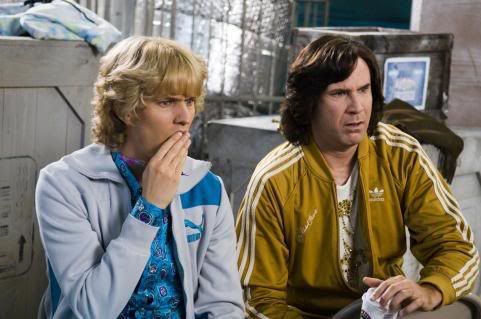
There's no accounting for taste, especially in matters of the funny. While one person could see an Adam Sandler film and think “Hah, this is hilarious, Adam Sandler is the comedic genius of our age”, another person could see the same film and think “Hah, I’d rather stick my head in a toaster oven than endure another minute of this.”
Comedy is a fickle thing, varying greatly from one person to the next. I was once in a room with a girl I didn’t know very well. The Simpsons were on the television and this girl didn’t laugh once. Never even cracked a smile. This was when I decided I didn’t want to know her any better.
My favourite of the routines, however, was executed by the baddies of the film, a show stealing turn by Will Arnett and his real-life wife Amy Poehler. The duo play Stranz and Fairchild Van Waldenberg, a cartoonishly wicked brother and sister skating pair who are determined to take the top spot over Chazz and Jimmy. The pair dominate every scene they’re in, whether it’s a hilarious J.F.K./Marilyn
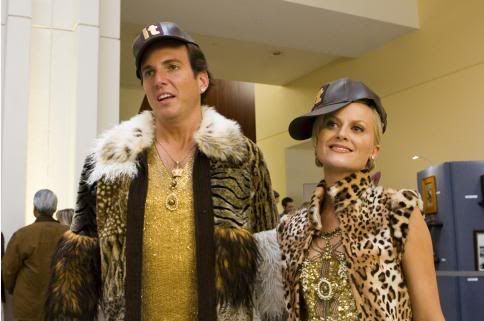
Monday, April 9, 2007
"The Women" (1939) George Cukor
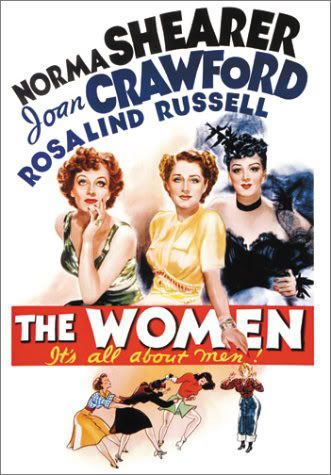
In the midst of a slew of Almodóvar films that I've been watching lately (5 since Saturday, and still another dvd to go), I managed to catch the vintage cat-fight that is George Cukor's The Women on TCM today. It's a two and a half hour oestrogen fest, with over 130 female speaking roles and not a single man in sight (unless you count Joan Crawford, of course...).
I'd wanted to see The Women ever since I rented The Philadelphia Story earlier this year. Included in the meagre special features were trailers for the director George Cukor's other films, and the trailer for The Women was so funny that I knew I had to watch it. Happily, the film lived up to it's campy, bitchy, funny trailer. The plot is slightly incomprehensible. Far from me to attempt to describe it, here's what the IMDB had to say:
Wealthy Mary Haines is unaware her husband is having an affair with shopgirl Crystal Allen. Sylvia Fowler and Edith Potter discover this from a manicurist and arrange for Mary to hear the gossip. On the train taking her to a
It doesn't really matter that we follow along, though. There's enough barbed tongues, moments of slapstick and fabulous dresses at play to make The Women a tremendously enjoyable society comedy. One could argue the point that it's demeaning, as it portrays women as being vicious gossips who talk of nothing but men. It's fair enough, even though there are no males in the film, they're the subject of almost every conversation and the old Countess DeLave can't open her mouth without cooing "L'amour, l'amour", but the point of The Women isn't to give a complete portrait of the female species. Indeed, the author of the Broadway play the film is based on, Clare Boothe Luce, meant for it to be a satirical attack on society women. Under the masterful direction of George Cukor, however, The Women becomes more sympathetic to it's characters, in all their silly, vapid and cruel ways.
For me, Rosalind Russell is the stand-out star as the scheming Sylvia Fowler. In His Girl Friday she was perfectly cast as the snarkily sweet reporter Hildy Johnson, but here she gets to showcase what an animated nutcase she can be; eyes flashing, hands flailing, pursuing her lips in distain, she prowls around in full-on Bitch Mode,
"Oh, you remember the awful things they said about what's-her-name before she jumped out the window? There. You see? I can't even remember her name, so who cares?"
"You simply must see my hairdresser, I DETEST whoever does yours."
and takes it upon herself to (suureptitiously) alert other women of affairs their husbands may be having.
Her cruel streak doesn't go unnoticed by the others, as is humourously demonstrated in her scenes with an unnamed exercise instructor like the following extract:
Exercise instructress:Arms flat. Crawl slowly up the wall.
Sylvia Fowler:The way you say that makes me feel like vermin.
Exercise instructress: That shouldn't be much effort. I mean, crawling up the wall...
or this one
Exercise instructress: Mrs. Fowler you've hardly moved a muscle.
Sylvia Fowler:Whose carcass is this, yours or mine?
Exercise instructress:It's yours, but I'm paid to exercise it.
Sylvia Fowler:You sound like a horse trainer.
Exercise instructress: No, Mrs. Fowler, but you're getting warm.
Her devotion to the role is evident; in the scene where she is fighting with Paulette Godard, Russell apparently actually bit the actress on the leg for real. IMDB informs me that although this left a lasting scar on Godard's leg, the two remained good friends. Go figure.
So, it's not exactly politically correct (released in 1939, one character advises another to "sprawl out in bed like a swastika") and there's a bizarre fashion show in the middle that switches into technicolour for no apparent reason, but The Women is still fresh, funny and catty enough to warrant an Easter Monday watching. Hopefully rumours of a remake are unfounded, part of it's charm is the sleek, black & white stylish aspect and in today's modern times, a line like Joan Crawford's parting shot at the top of this review would just not work.
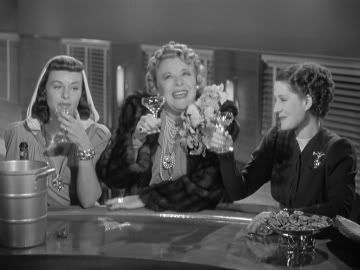
Saturday, April 7, 2007
I have a weakness for questionnares.
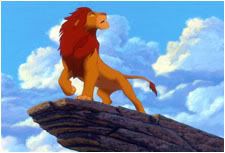
Got this from Cinecism - give her a big hand, please! And read her blog, she's quite funny.
How old were you when you first went to the cinema andwhat did you watch?:
I can remember a couple, but I have a feeling the first one I went to see was Aladdin. Just looking it up on the IMDB, I find that it was released in 1992, which would have made me two years old. I don't know, that seems a bit young, no? Although feasibly I might have been three. I also definititely saw the Lion King when I was four with my dad. Afterwards he asked me, "Wasn't that very sad when the lion died?", which apparently prompted the reply (now family legend), "Yeah. But what I found really sad was that one person can destroy a whole nation and let it go to waste". Precocious, moi?
Three films about films and/or cinema:
I'm utterly lost by this question. Just name three films? Your favourite ones about film? Huh? I'll just go the easy option and name three great ones. Singin' in the Rain – the pains of the transition from silent movies to “talkies”, All About Eve – okay, it’s theatre, not cinema, but it’s all about acting and the roles people play, and Adaption – the trials and tribulations of screenwriting.
Favourite Actresses:
Old style - Bette Davis and Kate Hepburn. Nowadays...I like Cate Blanchett, Jodie Foster, Penelope Cruz and some others.
A film that changed your life and why:
The Lion King. Because it was the first film I really had an emotional attachment to. I saw it twice in the cinema and had these plastic figures of all the characters that I used to play with. It’s one of my earliest memories, crouching down behind the threadbare couch in the Credit Union, waiting for my granny, playing with Simba and Mufasa. Sadly, I lost the figures when I left my bag on the bus once. A few years later, my parents surprised me with a VHS of the film and I nearly cried with happiness.
Great directors but which film of their's is your favourite? Kubrick, Hitchcock, Powell & Pressburger, Kurosawa, Lang.
This one confuses me also. Favourite film from each? Favourite film in total? Be more clear here, people. I'll just say Hitchcock, because I've seen more Hitch films than anything. Favourite? I'll say...Rear Window.
Charlie Chaplin, Harold Lloyd, Buster Keaton, Laurel And Hardy, who's the best?
Hector Mann. If anyone gets that reference, you can have my adbiding respect.
You're remaking a classic, which one and who's your new stars?
While some questions are confusing and some are boring, this one is blasphemy!
Miscast actors happens quite a bit, what's the worst you've seen?
Juliette Lewis in What's Eating Gilbert Grape?. I loved Johnny Depp and Leo diCaprio in it, I found the slightly-hokey storyline and quaint
Most overrated good movie?
The Shawshank Redemption. It’s a well-made piece of storytelling with some good acting, but that’s it really. Greatest film of all time? Hah.
Most overrated bad movie?
Nothing's coming to mind at the moment.
Worst movie ever?
I'm tempted to say Showgirls, but to be honest, it really is quite funny. And I have a soft spot for Kyle McLachlan, big ol' plank of wood that he is. So, I'm going to say either Dumb & Dumberer or Daddy Day Care. Both of which I saw in the cinema. Both of which against my will. Both of which were picked out by the same friend.
Favourite British films:
When I think of the words “British Films” I usually get a shiver of disgust roll down my spine. Images of Hugh Grant grinning foppishly, or Rowan Atkinson gurning away begin to circle nastily around my head. Shaking off these images takes some work, but then Danny Boyle comes to mind with Trainspotting and 28 Days Later.
Best road movies?
Thelma & Louise.
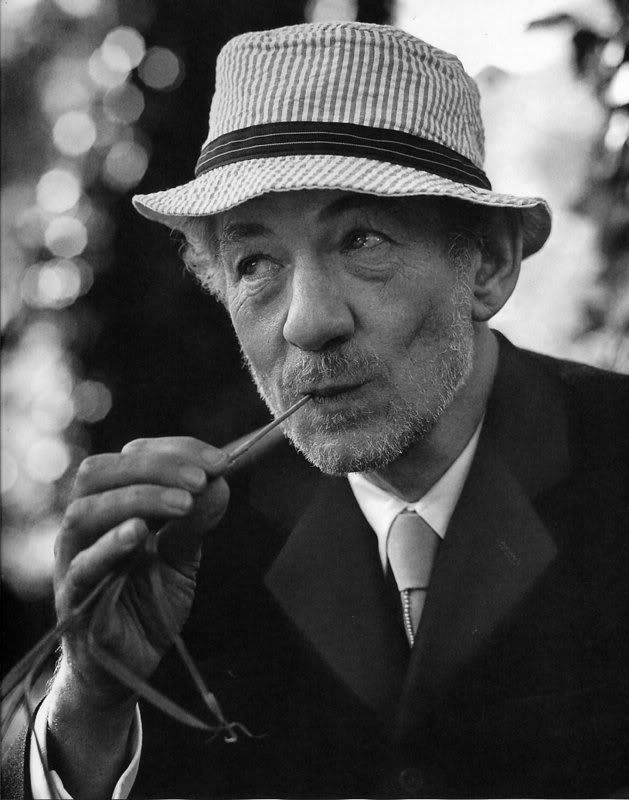 Favourite Actors:
Favourite Actors:
Why are actors and actresses seperate? And isn't "actress" wrong, anyhow? Awh, feck it. I like Jimmy Stewart, Cary Grant, Ian McKellen.
Who Would Play You In A Biopic Of Your Life?
The little girl who played Madeline in the live-action film.
Most Irritating Cinema Advert Ever:
30..29..28..27..THE MOVIE IS ABOUT TO START. BUT THERE'S STILL TIME TO GRAB A COKE. The countdown makes me feel nervous, the annoying wimpy colours, the fact that there actually isn't time to GRAB A COKE and the in-your-face advertising all turn me off. I usually try to shut my eyes during it.
Which Film Magazines/Forums Do You Read?
Empire, every month. It's a nice blend of stupid and intelligent. I've tried others, Total Film, Hot Dog and the rest, but Empire's still my best.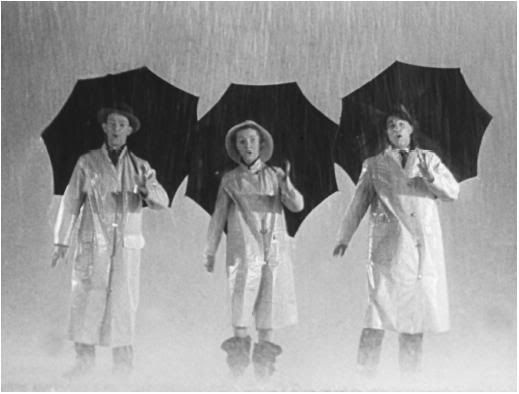 You Have To Swap Your Life With A Movie Plot, Which One Do You Choose?
You Have To Swap Your Life With A Movie Plot, Which One Do You Choose?
Singin' in the Rain, because if people spontaneously broke out into tap routines in their day to day lives, I'd be a whole lot happier. And 1920s film sets are one of my favourite film settings.
A film that scared you at the cinema/home?
Is "everything" an okay answer? No? Okay, at a sleepover in 2001 I saw Scream, I Know What You Did Last Summer, An Interview With The Vampire and some others. That night haunted me for months, there was literally no free moment that I didn't start to reply some of those images back in my head. On the more positive side of the scale, my family watched Wait Until Dark with Audrey Hepburn one Christmas and there was one scene where everyone simultaneously jumped in fright, but it was a fun fright.
Your favourite silent movie?
I watched The Wizard Of Oz with some friends back in September. It was that special edition dvd, the one that sings. Afterwards, we put on the special features and watched two silent versions of the film. I don’t think I’ve ever laughed so hard in my life.
A crap film that you know is crap but you love?
I know that Mean Girls isn’t Shakespeare, but in my mind it’s the best teen comedy since the days of John Hughes. I wouldn't say it was crap, per se, but people seem surprised when I mention how much I love it.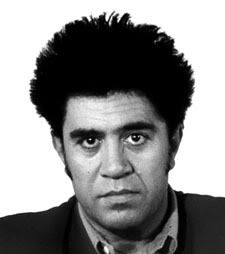 Favourite Directors: Hitchcock, Billy Wilder, Pedro Almodóvar.
Favourite Directors: Hitchcock, Billy Wilder, Pedro Almodóvar.
Recommend three films that will change the way you view film:
All About My Mother, for those who hate Foreign Film. Sunset Boulevard, for almost breaking the fourth wall. Toy Story, for those who complain technology will overshadow good storytelling.
On Screen Love Stories:
Moulin Rouge! is the simplest of simple stories, but it’s beautifully executed, Casablanca for love and sacrifice and High Fidelity for honesty and good tunes.
Met Any Movie Stars?
Nope. Although Colin Farrell was in my local Superquinn last week (I was in
What's your favourite period of cinema? e.g. 20s German expressionism, French New Wave etc:
I haven’t gotten deep enough into period genres to give a comprehensive answer, but I’m fond of the Classic Era (1920s-1940s)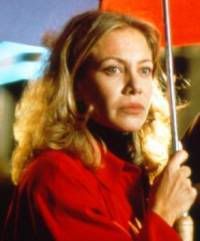 Favourite Soundtracks: All About My Mother, The Hours, Lost in Translation and Moulin Rouge.
Favourite Soundtracks: All About My Mother, The Hours, Lost in Translation and Moulin Rouge.
What Films Need A Sequel:
None, because if they're really good then it'll just wreck their legacy and if they're really bad, why would you want more?
The films you can quote ad infinitum
All About Eve, the first Toy Story, Mean Girls and the LOTR trilogy. Out of them all, I'd say Mean Girls is the one I can quote the best. I can even reel off some lines from the commentary, which is kinda sad.
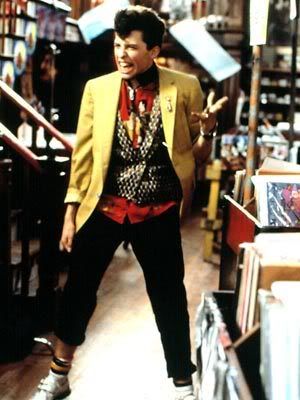 Who’s your favourite cult film hero?
Who’s your favourite cult film hero?
Ducky from Pretty in Pink. If a guy ever came into the record shop in which I worked and did a total wig-out dance to Try A Little Tenderness, I'd fall in love with him on the instant.
Pick one genre and give us five of your favourites from it e.g. Comedy, film noir, romance, musical etc:
Musical: Singin’ in the Rain, Moulin Rouge!, Guys & Dolls, The Lion King and The Wizard of Oz.
Two scenes that flood your tear ducts:
Hahahahahahaha. Two? Hahahahaha. *wipes eyes*….okay. In recent times, the end of Bobby (well, the whole way though actually, but the tears got more intense in the last 20 minutes or so) which wasn’t a great film, but really pulled out the emotional stops. And the scene in Toy Story where Buzz realises that he’s not an astronaut.
You're an interviewer, who do you interview and about which film?
I’d talk to (a resurrected) Donald O’Connor about filming Singin’ in the Rain. About whether Gene Kelly is really a bastard, how on earth he did those backflips, what Debbie Reynolds was like. And I’d shake his hand and say, “Sir, you did the best dance routine ever.”
Three great acting performances:
Because this question is almost exclusively male, I'll pick three girls for a change.Katherine Hepburn in Bringing up Baby (just hilarious, pairing her with Cary Grant is a match made in comedy heaven). Penelope Cruz in Volver (she was robbed! she was robbed! she was robbed!) Cecilia Roth in All About My Mother (for some of the best onscreen crying I've ever seen, among other reasons).
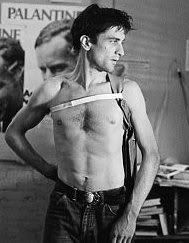 Who is your sex god/goddess? Young Robert deNiro, circa Taxi Driver.
Who is your sex god/goddess? Young Robert deNiro, circa Taxi Driver.

